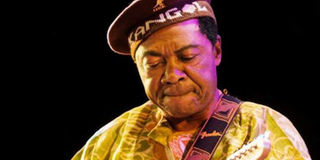Prime
Soukous Stars started with split but Lokassa held it together

Congolese guitarist Lokassa ya M’bongo who died on March 14, 2023. PHOTO/BBC
What you need to know:
- Lokassa, born in 1946 in Congo, is reputed for his stints with Tabu Ley’s Afrisa International from 1969 to 1978.
- Lokassa’s real breakthrough came in 1989 when he joined the other stars in Paris to form Soukous Stars. The band’s debut album Megamix Vol 1 featured the hit song, Nairobi Nights-Lagos Nights.
Lokassa and the Soukous Stars. That is what the name of the group would have been. It was a textbook; Franco and TP OK Jazz, Tabu Ley and Afrisa Internationale, Verckys and Veve, Aurlus Mabele and Loketo.
Most band leaders had their name appended on the band name. It was easy to see where things were going that day in 1989. But Lokassa ya Mbongo was a man who knew when to compromise. He dropped his name but not entirely.
When Ibrahim Sylla produced Lagos Night, he insisted on designing the sleeve with “Lokassa et Soukous Stars.
“I told ‘big brother’ [Lokassa] that the name was Soukous Stars,” recalls Shungu Omba, aka Ngouma Lokito.
Sylla would have his day. The record sold beyond the group’s imagination and they contemplated the idea of going with the name but they eventually maintained it as it is: Soukous Stars.
While Lokassa was the group’s leader, it was not his original idea. This was one major reason for his compromise. There was another.
“Lokassa did not form Soukous Stars, we all are co-founders and besides it was my idea. Lokassa was our big brother, do not confuse things, please,” Ngouma told this writer.
In 1989, Neil Zitany called on Ngouma. They were both living in Paris as sessional musicians.
The two agreed that if they formed a group, they could make more impact with their talent than waiting for crumbs thrown their way. But neither knew how to go about it.
Somewhere in Paris was a Congolese who was running frustrated with life as a sans-papiers (illegal immigrant). Lokassa recorded with several African and Antillean musicians but he could not tour or make recording dates outside France because of lack of cartes de séjour (residence permit).
So when Ngouma broached the idea of a music group, Lokassa saw gold shining in the form of music bars. He knew just who to call up.
Ngouma was the bassist, Germain ‘Dally Kimoko’ Ndala took the lead, with Yondo Sister as their poster vocalist alongside Hyacinthe ‘Canta’ Ballou, Neil Zitany and Lukombe Nzambi, aka Shimita el Diego.
“It was Dally who named the group Soukous Stars and we all agreed with that,” Ngouma says.
Soukous Stars allowed the terrific rhythmist, arranger and composer in Lokassa to express himself. There were no more limits and the luck that the group came with saw him gain his residence status the following year.
Lokassa’s expert rhythmic twang was the solid springboard upon which Dally Kimoko hit the solo in hits like Monica and Marie-Jose as if he was spiralling out of control.
This is something Lokassa had experimented with great success in Abidjan where, alongside lead guitarist Dizzy Mandjeku and drummer Ringo Moya, he had teamed up with Sam Mangwana to form The African All Stars.
In Suzana Coulibaly, there is that simple, repeated rhythms at a faster tempo that brings out Lokassa’s guitar eruptions in a compact seben.
There was Kanda Bongo Man who had compelled lead guitarists Nene Tchakou, Dally and Diblo Dibala to make their riffs dominate rather than only be heard in the sebene. Then there was Wenge Musica and Loketo.
The latter went blow-for-blow with Soukous Stars. The battle for the youth shook every corner of the continent.
Soukous Stars reached its peak of popularity in Paris during the early-to-mid-1990s before Lokassa relocated to the US (with it) as musicians like Yondo Sister sought solo careers.
By then, Lokassa had grown his hair into the pride of a baobab tree and he was indeed such a tree trunk in the Soukous world.
When he joined Tabu Ley in 1968, he was 22. He had taken that long by Congolese music career standards because his family said no to music.
Born Denis Kasiya Lokassa in Kinshasa in 1946, the man who would later start calling himself after money (Mbongo) while hitting the fame grinds in West Africa rested strings on Tuesday.
He had been battling with diabetes and complications related to a stroke he had suffered in 2020, from Nashua, New Hampshire, in the US where he had been living.
As an arranger, there were few who could talk with Lokassa. The last time someone compared him to compatriot Vata Mombasa, he took such a serious offence he wrote asking the Kenyan who did so to never degrade his tact by comparing him to people who could not even clean his guitar.
The elder of the Soukous Stars might have signed out on Tuesday, but the Congolese-Paris sounds he integrated live loud and large.





